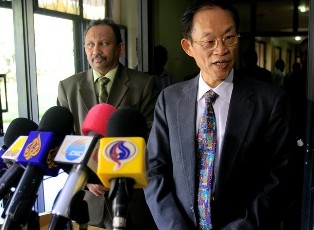Sudan’s parliament authorizes confiscation of oil exports
December 8, 2011 (KHARTOUM) – The Sudanese national assembly on Thursday approved an amendment to article (5) of the law governing the oil transit fees which now authorizes the finance ministry to seize crude exports as a form of payment if necessary.

According to the new provision, the finance ministry is now allowed to confiscate any portion of oil exports should the party that owns it fail to pay the required fees. This clause would be evaluated in the contracts signed between Khartoum and oil companies as well.
South Sudan has threatened last week to stop producing oil if that measure is adopted.
Last month, Khartoum quickly reversed a decision to block Juba from using its pipelines until all arrears are cleared since South Sudan became an independent state last July.
Sudanese officials claim that the south owes $727 million on four shipments of oil released and transferred through the oil installations in the north.
The two countries have been locked in negotiations for months under the auspices of the African Union High Level Implementation Panel (AUHIP) headed by former South African president Thabo Mbeki.
The parliament speaker Ahmed Ibrahim al-Tahir accused South Sudan of not being keen on reaching an agreement on the fair fee per barrel of oil exported by Juba.
Al-Tahir disclosed that Khartoum demanded $36 while Juba stressed that it will not pay more than $8 per barrel.
The Secretary General of Sudan’s oil ministry Awad Abdel-Fattah said today that they will not accept any figure beside the one they pushed in their negotiations with South Sudan.
China which has the largest stake in Sudan’s oil has dispatched its envoy Liu Guijin in a bid to bridge the differences between the two ex-foes amid fears by Beijing of a disruption to its oil supplies.
The growing world power depends on South Sudan for nearly five percent of its oil imports.
The state-run China National Petroleum Corporation (CNPC) has pumped billions of dollars into developing oilfields in Sudan, 80 percent of which lie in the south.
Speaking to reporters after his talks with Sudan’s foreign minister Ali Karti, the Chinese envoy said that Khartoum and Juba have no option but to negotiate and offer concessions in order to resolve this issue and other outstanding ones.
“Due to the tensions in the states of Southern Kordofan and Blue Nile, both sides have no option but to reach a deal,” Guijin said.
Guijin said that he will do his best to help the two countries agree adding that he informed South Sudan government and the mediation team led by Mbeki that he has a comprehensive vision of a solution.
The Sudanese foreign ministry spokesperson Al-Obaid Marwih said that his government has given the maximum concessions it could but confirmed that they will not close the pipelines under any circumstances.
“But if the intransigence of the other party continues there is nothing we can do and we have felt that the south is not ready to make concessions or even an objective proposal,” Marwih said.
South Sudan has been mulling a separate pipeline through Kenya to avoid using the ones in the north but analysts say that this will take years to build.
This week the French oil company Total suggested that it could build a pipeline to be shared by South Sudan and Uganda that exports oil through either Kenya or Tanzania.
(ST)
